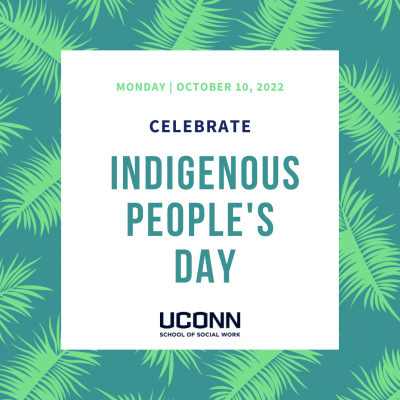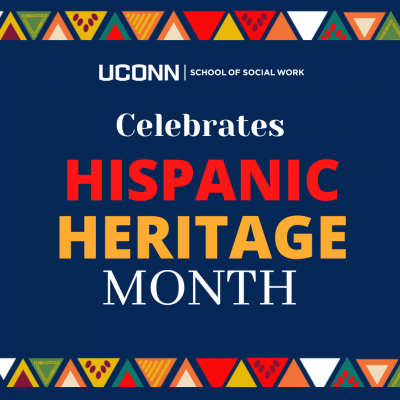Several UConn School of Social Work faculty and students are presenting their research at the 27th annual Society for Social Work and Research (SSWR) conference in Phoenix, Arizona, from January 11 to 15. The theme of the conference is "Social Work Science and Complex Problems: Battling Inequities and Building Solutions." The research presented by SSW covers a wide range of areas and our expertise, including child welfare, foster care, sexual and gender minority youth mental health, and substance use, among others.
Thursday, January 12
Time: 3:15 – 4:45 PM
Presentation: Factors Associated with Child Welfare Diversion for Substance-Exposed Infants
Location: Hospitality 2 – Room 444
Author(s): Margaret Lloyd Sieger, PhD, University of Connecticut School of Social Work; Cynthia Nichols, LCSW, University of Connecticut School of Social Work; Melissa Sienna, UConn Health; Marilyn Sanders, MD, UConn School of Medicine
Friday, January 13
Time: 7:00 – 8:30 AM
Presentation: Acamamas: Academic Mothers
Location: Paradise Valley
Author(s): Cristina Mogro-Wilson, PhD, University of Connecticut School of Social Work; Nalini Negi, PhD, University of Maryland Baltimore; Danielle Parrish, PhD, Baylor University
Time: 8:00 – 9:30 AM
Presentation: Changes in Social Support over Time and Attention to Congregate Care Placement Among Older Youth Transitioning from Foster Care: Ages 17-24
Location: Hospitality 3 – Room 432
Author(s): Keunhye Park, PhD, Michigan State University; Nathanael Okpych, PhD, University of Connecticut School of Social Work; Mark Courtney, PhD, University of Chicago
Time: 8:00 – 9:30 AM
Presentation: Emerging into Parenthood While in Foster Care: Correlates of Active Parenting Behaviors at Ages 21 and 23
Location: Hospitality 3 – Room 432
Author(s): Justin Harty, PhD, Arizona State University; Sunggeun (Ethan) Park, PhD, University of Michigan-Ann Arbor; Nathanael Okpych, PhD, University of Connecticut School of Social Work; Mark Courtney, PhD, University of Chicago
Time: 8:00 – 9:30 AM
Presentation: Examining Prevalence and Predictors of Food Insecurity for Transition-Age Foster Youth
Location: Hospitality 3 – Room 432
Author(s): Melanie Nadon, University of Chicago; Sunggeun (Ethan) Park, PhD, University of Michigan-Ann Arbor; Nathanael Okpych, PhD, University of Connecticut School of Social Work; Justin Harty, PhD, Arizona State University; Mark Courtney, PhD, University of Chicago
Time: 8:00 – 9:30 AM
Presentation: The Role of Enduring Relationships in Early-Adult Outcomes Among Youth Transitioning out of Foster Care
Location: Hospitality 3 – Room 432
Author(s): Nathanael Okpych, PhD, University of Connecticut School of Social Work; Sunggeun (Ethan) Park, PhD, University of Michigan-Ann Arbor; Jenna Powers, MSW, University of Connecticut School of Social Work; Justin Harty, PhD, Arizona State University; Mark Courtney, PhD, University of Chicago
Time: 8:00 – 9:30 AM
Presentation: The Impact of a Teaching Peer Support Group on Doctoral Student Instructors: A Collaborative Autoethnography
Location: Hospitality 1 – Room 443
Author(s): Madri Hall-Faul, MSW, University of Connecticut School of Social Work;
Cindy Dubuque-Gallo, MSW, University of Connecticut School of Social Work; Grace Felten, MSW, University of Connecticut School of Social Work; Maritza Vasquez Reyes, MA, LCSW, University of Connecticut School of Social Work
Time: 9:45 – 11:15 AM
ePoster Presentation IV: Fear and Stigma with Home Visiting: Barriers to Participation
Location: Phoenix C
Author(s): Megan Feely, PhD, University of Connecticut School of Social Work; Grace Felten, MSW, University of Connecticut School of Social Work; Kathryn E. Parr, PhD, University of Connecticut School of Social Work
Time: 9:45 – 11:15 AM
Presentation: A Whole Health Model of Care to Promote Health Equity and Social Justice
Location: Camelback B
Author(s): Anna Faul, PhD, University of Louisville; Pamela Yankeelov, PhD, University of Louisville;
Madri Hall-Faul, MSW, University of Connecticut School of Social Work; Samantha G. Cotton, PhD, University of Louisville Trager Institute; Joseph D'Ambrosio, PhD, University of Louisville Trager Institute; Barbara Gordon, MA, University of Louisville Trager Institute
Saturday, January 14
Time: 9:45 – 11:15 AM
ePoster Presentations IX: Affirmative CBT: Longitudinal Change Processes for Sexual and Gender Minority Youth
Location:
Author(s): Shelley L. Craig, PhD, LCSW, University of Toronto; Vivian Leung, MA, University of Toronto; Jenny Hui, MA, University of Toronto; Frank Dillon, PhD, Arizona State University; Ashley Austin, PhD, Barry University; Rachael Pascoe, MSW, RSW, University of Toronto; Gio Iacono, PhD, MSW, RSW, University of Connecticut School of Social Work; Nelson Pang, MSW, University of Toronto
Time: 11:30 AM – 12:30 PM
Presentation: Annual Social Policy Forum: Democracy?!?!
Location: Phoenix D/E
Author(s): Darcey Merritt, PhD, University of Chicago Crown Family School of Social Work; Maria Blunt-Carter, MSW, Rutgers School of Social Work; Justin Hodge, MSW, University of Michigan-Ann Arbor; and Tanya Rhodes Smith, MSW, University of Connecticut School of Social Work
Time: 4:00 – 5:30 PM
Presentation: Direct Scribing as a Rigor-Promoting Technique: Centering Youth Voice throughout Data Collection and Analysis
Location: Encanto A
Author(s): Jenna Powers, MSW, University of Connecticut School of Social Work
Time: 4:00 – 5:30 PM
Presentation: The Relationship between Legal Permanency Among Older Foster Youth and Their Outcomes
Location: Ahwatukee A
Author(s): Mark Courtney, PhD, University of Chicago; Sunggeun (Ethan) Park, PhD, University of Michigan-Ann Arbor; Nathanael Okpych, PhD, University of Connecticut School of Social Work; Justin Harty, PhD, Arizona State University
Sunday, January 15
Time: 8:00 – 9:30 AM
ePoster Presentations XI: Risk, Race/Ethnicity and Subsequent Reports in a State’s Differential Response System
Location: Marquis BR Salon 6
Author(s): Megan Feely, PhD, University of Connecticut School of Social Work; Brenda Kurz, PhD, University of Connecticut School of Social Work; Patricia Carlson, PhD, University of Connecticut School of Social Work; Melissa Ives, MSW, University of Connecticut School of Social Work; Joshua Pierce, BA, University of Connecticut School of Social Work; Kimberly Nilson, State of Connecticut Department of Children and Families
Time: 8:00 – 9:30 AM
ePoster Presentations XI: Doulas: A Possible Solution to Birth Inequities Among Families of Color
Location: Phoenix C
Author(s): Mollie Lazar Charter, PhD, MSW, Fordham University; Kathryn E. Parr, PhD, University of Connecticut School of Social Work, Jane Lee, University of Connecticut School of Social Work, Juliany Polar, University of Connecticut School of Social Work
Time: 9:45 – 11:15 AM
Presentation: State-Level Predictors of Core Priorities Spending in the Temporary Assistance for Needy Families (TANF) Program: Implications for Human Rights and Equity
Location: Laveen B
Author(s): Madri Hall-Faul, MSW, University of Connecticut School of Social Work; Anna Faul, PhD, University of Louisville
Time: 9:45 – 11:15 AM
Presentation: Critical Time Intervention for People Leaving Residential Substance Use Treatment: The Feasibility and Preliminary Impact of a Pilot Randomized Trial
Location: Hospitality 1 – Room 443
Author(s): Jennifer Manuel, PhD, University of Connecticut School of Social Work; Khadija Israel, MSW, New York University; Yeqing Yuan, PhD, LCSW, New York University; Laura Esquivel, MSW, New York University; Laura Curran, MA, New York University; Daniel Herman, Hunter College Silberman School of Social Work
Time: 9:45 – 11:15 AM
Presentation: Writing and Reviewing for Refereed Journals: Discussion with Editorial Advisory Board Members
Location: Valley of the Sun E
Author(s): Cristina Mogro-Wilson, PhD, University of Connecticut School of Social Work; Sondra Fogel, PhD, University of South Florida; and Kirstin Anderson, Social Current
Time: 11:30 AM – 1:00 PM
Presentation: Rates of Infants Reported to CPS at Birth for Prenatal Substance Exposure: A Panel Data Analysis
Location: Estrella
Author(s): Rebecca Rebbe, PhD, University of Southern California; Margaret Lloyd Sieger, PhD, University of Connecticut School of Social Work; John Prindle, PhD, University of Southern California
Time: 11:30 AM – 1:00 PM
Presentation: Connect: Plans of Safe Care for Substance-Exposed Infants
Location: Estrella
Author(s): Margaret Lloyd Sieger, PhD, University of Connecticut School of Social Work; Cynthia Nichols, MSW, University of Connecticut School of Social Work; Ira J. Chasnoff, MD, NTI Upstream
Time: 11:30 AM – 1:00 PM
Presentation: A Primer on Conducting Scoping Reviews: Purpose, Guidelines, and Resources
Location: Camelback A
Author(s): Jon Phillips, PhD, University of Connecticut School of Social Work; Daniel Gibbs, MSW, JD, University of North Carolina at Chapel Hill; Kalah M. Villagrana, MSW, MPA, Arizona State University; and Elizabeth Jurczak, MSW, University of Connecticut School of Social Work
 People’s Day.
People’s Day.